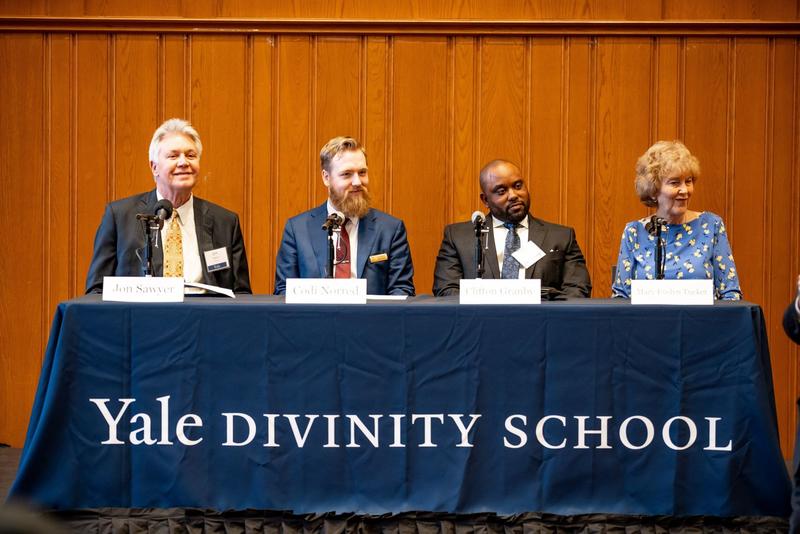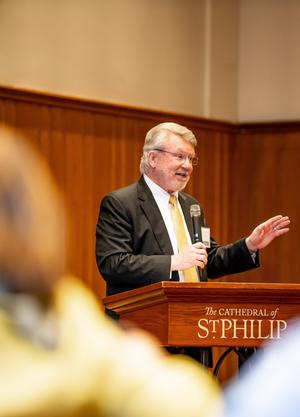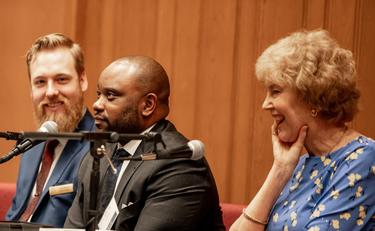Hope does not come easy or cheap, as YDS Professor Clifton Granby put it, in a time when climate change is advancing and human society seems unable to respond.
But while not flinching from the enormity of the challenge—the greatest humans have ever faced, in the words of panel member Mary Evelyn Tucker—a YDS public forum in Atlanta on March 12 offered the audience reasons to hope and actions to take to address the crisis.
“The good news,” said Tucker, cofounder of the Yale Forum on Religion and Ecology, “is that young people, indigenous people, and religious leaders and laity … are mounting a fierce moral force. It is like a leaven, like a yeast. That’s what gives us hope. I invite us against all odds to a hope that tells us we are not alone in the great ecosystems of the Earth and we are here to continue these forces of life.”
 Titled “Beyond Despair and Denial: Facing Climate Change with Moral Urgency and Hope,” the Atlanta panel was part of a series of Divinity School public forms held around the country to apply a theological and ethical lens to pressing public issues. Held at the Cathedral of St. Philip (where Sam Candler ‘82 M.Div. serves as Dean), the event featured the following panelists:
Titled “Beyond Despair and Denial: Facing Climate Change with Moral Urgency and Hope,” the Atlanta panel was part of a series of Divinity School public forms held around the country to apply a theological and ethical lens to pressing public issues. Held at the Cathedral of St. Philip (where Sam Candler ‘82 M.Div. serves as Dean), the event featured the following panelists:
- Clifton Granby, Assistant Professor of Ethics and Philosophy at Yale Divinity School
- Codi Norred, Program Director of Georgia Interfaith Power & Light
- Jon Sawyer ‘74 B.A., Founding Director of the Pulitzer Center on Crisis Reporting, and
- Mary Evelyn Tucker, Senior Lecturer and Senior Research Scholar in Religion and Ecology at the Divinity School and School of Forestry & Environmental Studies.
In his introductory remarks, YDS Dean Greg Sterling quoted Gus Speth, who was Dean of F&ES from 1999 to 2009:
 “Gus said, ‘I used to think that the top environmental problems were biodiversity loss, ecosystem collapse, and climate change. I thought that with 30 years of good science, we could address those problems. But I was wrong. The top environmental problems are selfishness, greed, and apathy. And to deal with those issues, we need a spiritual and cultural transformation, and we scientists do not know how to do that.’”
“Gus said, ‘I used to think that the top environmental problems were biodiversity loss, ecosystem collapse, and climate change. I thought that with 30 years of good science, we could address those problems. But I was wrong. The top environmental problems are selfishness, greed, and apathy. And to deal with those issues, we need a spiritual and cultural transformation, and we scientists do not know how to do that.’”
“That,” Sterling said, “is the business of religion. And that is why we are here tonight.”
Granby, who teaches a course on environmental justice and ethics (among other courses), spoke about a constant “state of crisis … that makes and marks our contemporary moment.”
 Whether it’s a crisis narrowly averted or one looming in the future, whether it’s a crisis in the banking system or national defense or the health of our democracy, “this nagging sense of crisis makes it difficult for us to widen our moral sphere of concern beyond what is immediate, practical, and near,” Granby said. “All of this encourages not just denial of climate change but … acceptance of the terms of what those in power would tell us is most practical.”
Whether it’s a crisis narrowly averted or one looming in the future, whether it’s a crisis in the banking system or national defense or the health of our democracy, “this nagging sense of crisis makes it difficult for us to widen our moral sphere of concern beyond what is immediate, practical, and near,” Granby said. “All of this encourages not just denial of climate change but … acceptance of the terms of what those in power would tell us is most practical.”
***
***
Granby called on the audience of Yale alumni, church members, and concerned members of the public to “tell different stories about ourselves, about the land, about what flourishing and community look like.” This, he said, “will require us to jettison our desires for sovereignty and dominion. We’ll also need to make room for lament. There are no easy solutions here, but there are more responsible and sensible ways to live. I take hope in that.”
Approximately 150 people attended the event, with another 160 watching the live broadcast. The event was presented by YDS and the School of Forestry & Environmental Studies and cosponsored by the Yale Club of Georgia.
All photos by Omar Lopez Thismon